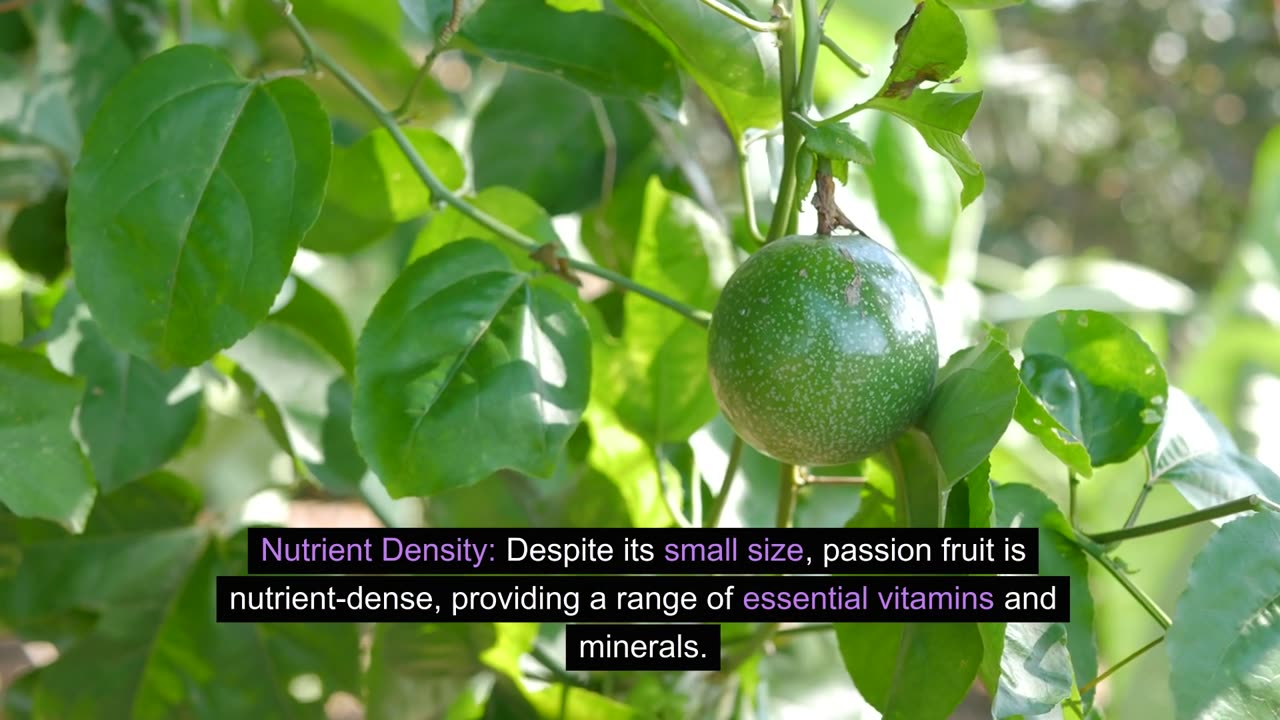Premium Only Content

Things you may not know about this exotic fruit passion fruit.
Vitamins: Passion fruit is a good source of vitamin C, vitamin A, and various B vitamins such as riboflavin (B2) and niacin (B3).
Dietary Fiber: It is high in dietary fiber, which is beneficial for digestive health.
Minerals: Passion fruit contains minerals such as potassium, iron, and copper.
Antioxidants: The fruit is rich in antioxidants, including carotenoids and polyphenols, which help combat oxidative stress in the body.
Carbohydrates: It contains natural sugars like fructose and glucose.
Protein: While not a high-protein fruit, passion fruit does provide some protein.
Health Pros:
Rich in Antioxidants: Antioxidants in passion fruit may help protect cells from damage caused by free radicals, potentially reducing the risk of chronic diseases.
Vitamin C Boost: Passion fruit is an excellent source of vitamin C, contributing to a healthy immune system, skin health, and collagen production.
Dietary Fiber: The high fiber content supports digestive health, helps regulate blood sugar levels, and may aid in weight management.
Heart Health: Potassium in passion fruit can contribute to maintaining healthy blood pressure levels.
Iron Absorption: The vitamin C content enhances the absorption of non-heme iron from plant-based foods, making it beneficial for individuals with iron-deficiency anemia.
Low in Calories: Passion fruit is relatively low in calories, making it a healthy snack option for those watching their calorie intake.
Cons:
Natural Sugars: While the sugars in passion fruit are natural, people with certain health conditions like diabetes should monitor their intake.
Allergies: Some individuals may be allergic to passion fruit, leading to symptoms such as itching, hives, or swelling.
Acidity: The fruit's high acidity may be problematic for individuals with acid reflux or sensitive stomachs.
Not a Protein Source: While it provides some protein, it's not a significant source, so those with high protein needs should supplement with other protein-rich foods.
Interactions with Medications: Passion fruit may interact with certain medications, so individuals taking prescription drugs should consult their healthcare provider.
Facts:
Origin: Passion fruit is native to South America but is now grown in many tropical and subtropical regions worldwide.
Varieties: There are various varieties of passion fruit, and they can differ in taste, size, and color. Common varieties include purple, yellow, and giant passion fruit.
Versatility: Passion fruit can be consumed fresh, juiced, or used in various culinary applications, such as desserts, sauces, and beverages.
Culinary Uses: The aromatic and tangy flavor of passion fruit makes it a popular addition to fruit salads, smoothies, desserts, and cocktails.
Nutrient Density: Despite its small size, passion fruit is nutrient-dense, providing a range of essential vitamins and minerals.
-
 1:00:47
1:00:47
Trumpet Daily
18 hours ago $3.36 earnedEurope’s Sudden Turn Against America - Trumpet Daily | Mar. 6 2025
3.61K9 -
 14:58
14:58
BEK TV
1 day agoDUNSEITH DECLASSIFIED: UNRAVELING THE EXPLOSIVE TRUTH BEHIND A MINOT MURDER AND A SCANDAL!
3.2K -
 3:28:45
3:28:45
Price of Reason
13 hours agoTrump DELAYS Tariffs With Mexico! Mickey 17 Review! Gavin Newson Hosts Charlie Kirk! GTA6 EXPENSIVE!
41.3K12 -
 2:43:35
2:43:35
TimcastIRL
10 hours agoDemocrats SHUT DOWN Congress Blocking Censure Of Al Green, OBSTRUCT House w/Joe Redden | Timcast IRL
159K66 -
 1:03:27
1:03:27
Glenn Greenwald
13 hours agoUK Pressures Apple to Break Encryption in Major Privacy Clash; How Dems Can Win Back the Working Class: With Former Bernie Sanders Campaign Manager Faiz Shakir | SYSTEM UPDATE #419
93K85 -
 47:39
47:39
Michael Franzese
12 hours agoJewelry King Trax NYC EXPOSES How the Powerful Steal from You
92.5K14 -
 2:36:02
2:36:02
Slightly Offensive
11 hours ago $23.46 earnedCandace REDPILLS the Masses in BOMBSHELL Theo Von Interview | Guest: Shane Cashman
70.1K38 -
 2:29:20
2:29:20
DLDAfterDark
8 hours ago $6.71 earnedDLD Live! That Sh... Will Get You K***ed! What To Consider in SHTF
42K4 -
 2:15:08
2:15:08
megimu32
11 hours agoON THE SUBJECT: IRL Streamers Attacked & Nostalgic Animal Movies That Made Us Cry
72.9K5 -
 1:00:54
1:00:54
The Tom Renz Show
15 hours agoMore Epstein/FBI, a Scary Trade War, & the Dem Echo Chamber
58K11